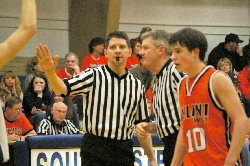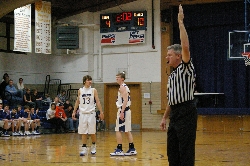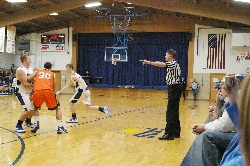University News
WIU employees selected to officiate at state games
March 18, 2010
MACOMB, IL - - When the top high school basketball teams face off during the Illinois High School Association (IHSA) Class 3A/4A tournament in Peoria (IL) this weekend, it won't be just the players who have made it there after years of practice and hard work.
It's the ultimate achievement for those in black and white to have risen to the state tournament level as well.
Two Western Illinois University employees, who have worked as basketball officials in addition to their full-time jobs for many years, have been selected by the IHSA to officiate at the state tournament Friday and Saturday, March 19 and 20. Sam Moran, police lieutenant at Western's Office of Public Safety (OPS), and Jude Kiah, director of the University Bookstore and the Go West public transit system, will officiate at the 3A/4A Boys Basketball State Tournament in the Peoria Civic Center's Carver Arena.
Rising up through the ranks of referees to officiate at the state games is a goal the two have worked toward for more than 14 years. Of the more than 5,500 officials basketball in Illinois, only 12 are selected to officiate at the 3A/4A tournament level, Kiah noted.
"It's such a small chance that you don't even dream of doing it. That's what's humbling about this," he said.
Moran, of Lewistown (IL), has been a basketball official for 22 years. He got his start officiating fifth and sixth grade games while raising a son and daughter, and after taking the IHSA's licensing examination, moved on to the high school level, officiating games throughout Fulton and McDonough counties.
Kiah, a Florida and New York native, also began his officiating career 22 years ago, when he was playing Amateur Softball Association (ASA) fast-pitch softball and serving as an umpire.
"I had an uncle who was a basketball official, and he asked me if I wanted to get involved," he explained. "When I first started, I got pretty low ratings. I wasn't very good. But I wanted to get better and I wanted my uncle to be proud of me."
He continued to work as an official in Georgia, officiating college-level games, before moving to Illinois and working in student housing at WIU. In 1996, when Moran learned that another member of the WIU community was an experienced basketball official, he knocked on Kiah's door.
For all of the 14 years since then, the duo has striven to improve and to "get seen" in the officiating sphere, for the chance to officiate at the larger-conference games.
"Our officiating is more in the style of the kind of play you typically see in the larger conferences," Kiah explained.
Moran pointed out that has meant being away from home three nights per week, traveling to games that might require a 100-mile one-way trip, working during holiday tournaments and balancing it all with their primary work schedules.
"We've been very blessed to have our families and other people surrounding us who helped us be able to make these sacrifices," Moran said. "We both have a lot invested in it."
"At some point you put away the idea of doing it to make extra money, and you just do it out of a sense of always wanting to improve, of loyalty, and of wanting to get to this level," Kiah added. "We have to be our own judges, with a sense of internal motivation, because it's not a job where you get patted on the back."
Illinois basketball officials are rated by coaches and colleagues on individual game performance and on how they compare with other officials. Their work is evaluated by assignors at summer camps as well as by state-level evaluators who watch their performances. After consistently receiving high ratings, Moran and Kiah eventually were requested to serve as referees for the Sweet 16 and then Elite 8 games, working their first super sectional in 2009.
"Once we realized we might be able to be on the floor in Peoria, then [we pursued it with] laser focus," Kiah said.
"That led to some heated discussions on the way home from games," Moran added. "We might dissect games for two hours afterward."
Kiah, who serves as basketball chair of the West Central Basketball Officials Association, credits this scrutiny and attention to detail in their having been selected to officiate at the state games.
"We are very critical of each other, talking about what we can do better," he said. "We're always asking ourselves about everything from individual calls, to 'was my whistle too quick?,' to how approachable we are for the coaches, down to how our shoes look. We've applied that for years, with the thinking that if you stop getting better, you're getting worse. It's a team mentality."
"It goes a lot farther than just the officiating," Moran added. "It's the ethics and professionalism you show, from not 'dumping' a game to take another because you think it's going to be a better game, to your physical conditioning, to the time you arrive. I think it's those things that set us apart."
Another important factor in officiating is their ability to be objective.
"If you ask any of the coaches, I think they would tell you that we are fair and consistent," Moran said.
That doesn't mean, however, that they don't receive complaints about calls, Kiah pointed out.
And what about heckling from the crowd?
"It's kind of a moot point, because you're not focused on the crowd, you're so focused on the students," Moran said. "You're focused on the kids, not on what people say."
Kiah said that coming from a rural area makes the fact that he and Moran got assigned to officiate at the tournament together even more of an honor. Many of the officials are assigned individually and come from the larger conference areas, he explained.
"The honor is getting to go to the tournament, but officiating at it as partners is really the crown jewel," Moran said.
Posted By: University Communications (U-Communications@wiu.edu)
Office of University Communications & Marketing




Connect with us: